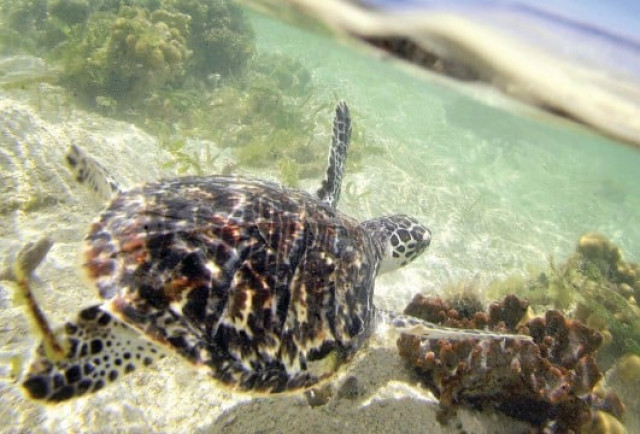Making beaches turtle friendly
180 children, teachers clean up the turtle-nesting beach under WWF programme.

Armed with black garbage bags and gloves, the students and staff were there to clean up the turtle-nesting beach under a programme organised by the World Wildlife Fund-Pakistan (WWF-P) in collaboration with the British Overseas School.
The Sandspit turtle beach is situated southwest of Karachi and is one of the most frequented beaches in the city. It also a nesting ground for sea turtles.
The clean up event included briefings on the importance of beach cleaning, garbage collection and its proper disposal.
Dr Babar Hussain, in-charge of the WWF-P’s wetland centre, told the participants that Sandspit is being damaged by increasing pollution. While its colour-changing waters and yellow sands attract thousands of visitors, it is these visitors who have disfigured the once “pristine, pollution-free and clean” beach.
He said that the beach is known for being one of the preferred nesting grounds for marine turtles, particularly of Green and Olive Ridley turtles.
According to coastal ecology expert Ali Hasnain, there is a need to work on protecting beaches from pollution, and more importantly, to stop projecting them as ‘tourist resorts’.
WWF-P’s turtle conservation expert Saveeta Advani gave a briefing on the different characteristics of the turtles and their nesting habits.
“The nesting takes place in the early winter months, starting from August, and continuing to around February,” she said.
Highlighting the role of the WWF in Pakistan, she said that for the last several years the organisation has been involved in turtle conservation activities, spearheaded by their wetland centre at Sandspit.
Saleem Shaikh, the wildlife fund’s environmental educationist, also shared information on the fund’s activities. “Different awareness-raising programmes are carried out in support with schools, colleges, universities, media and the corporate sector, in which members of the civil society are sensitised about environmental pollution and their impact on our beaches,” he said.
A teacher from the British Overseas School, Zaib Khan, appreciated the efforts of the WWF-P and said these programmes help to educate their children and make them realise the importance of maintaining a clean environment.
Threats to turtles
Fehmida Firdous writes in her paper on sea turtles, two of the seven species of marine turtles in the world nest at Sandspit and Hawkes Bay: the Green turtle (Chelonia mydas) and the Olive Ridley.
While sea turtles are not part of our diet, the threats to both species are still dire. Occasional poachers, curious tourists and feral dogs that dig up turtle nests for food coupled with the construction of beach huts all along the beaches and the pollution and disturbance that comes with it, are all factors that interfere with the nesting cycle of the turtles.
Published in The Express Tribune, December 1st, 2010.


















COMMENTS
Comments are moderated and generally will be posted if they are on-topic and not abusive.
For more information, please see our Comments FAQ